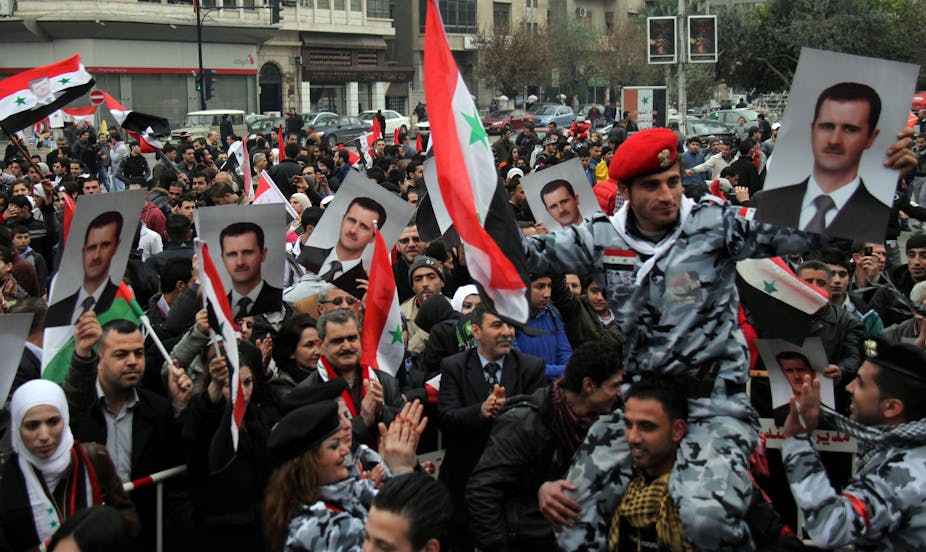The stench of hypocrisy is a hard one to wash out for the West in the Middle East.
We shook Gadaffi’s hand and pretended we liked his outfits when he coughed up for Lockerbie and we snuggled with Mubarak for decades because he kept peace with Israel. But when the wind changed we unfriended both of them like a teenager’s Facebook vendetta.
And for the last decade we screamed blue murder when Iran supported an armed insurrection in Iraq and shipped rockets to Hezbollah. But now we are happy to back the same sort of long and bloody revolt in Syria.
“But”, we say, “President Assad is a bad guy. He kills people and he doesn’t like elections. Even our democratic and humanitarian friends the Saudis and the Sudanese don’t like him. It’s just we don’t want to send the Eurofighters in this time because they might get shot down.”
The double and triple standards would be the highlight of the student union common room if the bumbling behind them weren’t so deadly serious in the repercussions it could have. Our “four legs good” approach to the Middle East is transpiring all over again as we pick a good and a bad team and cheer the game on. But this black and white world view is preposterous in a region with so many shades of grey.
I mean, what if President Assad was actually the good (or the least bad) guy?
Who becomes “our guy”?
Of concern is who will take over if the Assad regime does magically wither away. As in Libya there seems to be a collection of opportunist military officers and dissidents that have jumped ship and are now touting themselves as the best possible leader for a new and democratic Syria.

Their résumés are murky, their competence unknown and their popular support untested. It is not so long ago that we were trying to install charlatans like Ahmed Chalabi into positions of power in Iraq.
Men like this were chosen more for their ability to make the right noises and do lunch with influential Washington staffers than for any potential they offered to unite a fractured country.
The Libyan model
This “sponsorship-of-convenience"’ scenario is playing out again in Libya, where the disparate gaggle that is the National Transitional Council seems to be presiding over a gradual meltdown of what was left of the nation’s social structure.
Armed clashes and revenge killings are becoming more frequent and the transparency of government is as clear as a Sahara sandstorm. The torture chambers are still doing a screaming trade and certainly nobody is handing in that AK-47 they looted from the local police barracks. Just last week Médecins Sans Frontières said it would no longer provide care in detention centres in Misrata because its staff were being asked to patch up torture victims so they would be fit to go back in for another few rounds with the interrogators.
And the NTC were supposed to be the good guys.
A Syrian bloodbath
The likelihood of this sort of disintegration happening in Syria is quite real. When President Assad, his mouthpieces and the Russians say dissolving the government would lead to a civil war, they have a valid point. Yes, it’s one that comes from vested interests, but it’s certainly no loony conspiracy theory.
A split along ethno-religious lines is a possibility. Cities like Homs are already seeing some of the internecine struggles we saw on a grand scale in Baghdad, as Sunnis and Allawites start to square up and cleanse their neighbourhoods. Regional identities may also come into play, and there is the spectre of religious extremism lurking in the wings.

Throughout the Syrian conflict there has been very little mention in the Western media of what support the Assad government has from its own citizens.
If pro-government rallies are shown, it tends to be with a cynical eye and the assumption the crowds are there at gunpoint. But there is a significant slice of the population, particularly the middle and merchant classes, that fears regime change for the instability it could bring. They would rather live in Damascus under Assad than a refugee camp under Ban Ki-Moon.
A recent opinion poll conducted by the independent think-tank ”The Doha Debates" showed 55% of Syrians did not want their president to resign.
Fear for the country’s future was the main reason given for this pro-government line. It’s very hard for Westerners to get their heads around the idea that people can accept not living free, but when the alternative is the chaos of post-invasion Iraq or now Libya, it’s not hard to see the merit in the “business as usual” approach.
Who are the Free Syrian Army?
Also assisting the Syrian government’s support is the conspiracy that Israel, via the USA and Britian, is actually the force behind the uprisings.
Self-referential internet gossip says the CIA and MI6 are already training the Free Syrian Army in secret Turkish bases, and of course it is easy to sell the story that these organisations are just the cat’s paw of Mossad.
And, say the conspiracists, if it’s not the Israelis, it’s the Muslim fundamentalists who are behind it all. For Assad, there are plenty of “enemies within and enemies without” to blame. But that doesn’t mean he’s in the wrong about the potential for anarchy.
Nobody’s arguing that the Syrian leadership is some sort wholesome Scandinavian centre-left party, but we certainly need to get over the Hollywood idea that there are absolute categories of good and evil in Middle East politics.
Otherwise we’ll just keep spinning the same roulette wheel – one with many more colours than black and red.

